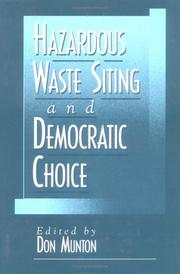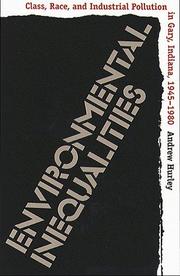| Listing 1 - 7 of 7 |
Sort by
|
Book
ISBN: 9629969254 9789629969257 Year: 2013 Publisher: Baltimore, Maryland : Baltimore, Md. : Project Muse, Project MUSE,
Abstract | Keywords | Export | Availability | Bookmark
 Loading...
Loading...Choose an application
- Reference Manager
- EndNote
- RefWorks (Direct export to RefWorks)
This volume addresses the management of conflicts that involve the siting of unwanted projects in the Asia-Pacific region. Contributors are renowned scholars in environmental policy and write from actual experience with the region, employing theoretical, comparative, and policy-based approaches to an analysis of environmental conflict, risk management, and public participation. The collection therefore will function as an invaluable resource for policymakers, environmentalists, and scholars of the Asia-Pacific and elsewhere.
NIMBY syndrome. --- Land use --- Land --- Land utilization --- Use of land --- Utilization of land --- Economics --- Land cover --- Landscape assessment --- NIMBY syndrome --- Locally unwanted land use syndrome --- LULU syndrome --- Nimbyism --- Not-in-my-back-yard syndrome --- Attitude (Psychology) --- Self-interest --- Planning --- Social aspects
Book
ISBN: 177199164X 1771991658 1771991631 9781771991643 9781771991650 9781771991636 9781771991667 1771991666 Year: 2018 Publisher: Athabasca University Press
Abstract | Keywords | Export | Availability | Bookmark
 Loading...
Loading...Choose an application
- Reference Manager
- EndNote
- RefWorks (Direct export to RefWorks)
Small Canadian cities confront serious social issues as a result of the neoliberal economic restructuring practiced by both federal and provincial governments since the 1980s. Drastic spending reductions and ongoing restraint in social assistance, income supports, and the provision of affordable housing, combined with the offloading of social responsibilities onto municipalities, has contributed to the generalization of social issues once chiefly associated with Canada’s largest urban centres. As the investigations in this volume illustrate, while some communities responded to these issues with inclusionary and progressive actions others were more exclusionary and reactive—revealing forms of discrimination, exclusion, and “othering” in the implementation of practices and policies. Importantly, however their investigations reveal a broad range of responses to the social issues they face. No matter the process and results of the proposed solutions, what the contributors uncovered were distinctive attributes of the small city as it struggles to confront increasingly complex social issues. If local governments accept a social agenda as part of its responsibilities, the contributors to Small Cities, Big Issues believe that small cities can succeed in reconceiving community based on the ideals of acceptance, accommodation, and inclusion.
Sociology, Urban --- Urban sociology --- Cities and towns --- BC --- social issues --- prostitution --- mental health --- nimbyism --- accommodation --- neoliberalism --- British Columbia --- homelessness --- Indigenous peoples --- Canada --- Social conditions --- Canada (Province) --- Canadae --- Ceanada --- Chanada --- Chanadey --- Dominio del Canadá --- Dominion of Canada --- Jianada --- Kʻaenada --- Kanada (Dominion) --- Ḳanadah --- Kanadaja --- Kanadas --- Ḳanade --- Kanado --- Kanakā --- Province of Canada --- Republica de Canadá --- Yn Chanadey --- Καναδάς --- Канада --- קאנאדע --- קנדה --- كندا --- کانادا --- カナダ --- 加拿大 --- 캐나다 --- Kaineḍā --- Lower Canada --- Upper Canada

ISBN: 0801435374 1501745255 Year: 1998 Publisher: Ithaca Cornell university press
Abstract | Keywords | Export | Availability | Bookmark
 Loading...
Loading...Choose an application
- Reference Manager
- EndNote
- RefWorks (Direct export to RefWorks)
Negative reaction to undesirable facilities in one's neighborhood-"not in my back yard"-isn't limited to the United States. Japanese communities have also resisted siting decisions for power plants, and have often delayed or killed projects for which a legitimate social need exists. NIMBY Politics in Japan is the first detailed account in English of energy siting disputes in postwar Japan. Based on an investigation of a hundred conventional and nuclear plants, the book draws on a wide range of local and corporate sources, as well as interviews with participants, to reveal the bargaining processes involved in social choices and their public policy outcomes. S. Hayden Lesbirel examines why some siting decisions have taken an extraordinarily long time to complete while others have proceeded rapidly. He focuses on the intensity of conflict, relative strengths among participants, and the role of compensation, and he shows how innovative uses of compensation often enable negotiated compromises to be reached. Stressing the importance of dynamic bargaining and creative responses to social and political problems, Lesbirel shows the value of negotiated compromises in Japanese consensual politics.
Electric power-plants --- Energy facilities --- NIMBY syndrome --- J4419 --- J7510 --- J4420 --- Locally unwanted land use syndrome --- LULU syndrome --- Nimbyism --- Not-in-my-back-yard syndrome --- Attitude (Psychology) --- Land use --- Self-interest --- Factories --- Power resources --- Electric power systems --- Power-plants --- Location --- Environmental aspects --- Social aspects --- Japan: Economy and industry -- industrial organization and relations -- industry and society and environment --- Japan: Science and technology -- biology -- ecology (general) --- Japan: Economy and industry -- resource industry

ISBN: 0878406255 Year: 1996 Volume: *1 Publisher: Washington, D.C. Georgetown University Press
Abstract | Keywords | Export | Availability | Bookmark
 Loading...
Loading...Choose an application
- Reference Manager
- EndNote
- RefWorks (Direct export to RefWorks)
Environmental protection. Environmental technology --- Economic geography --- Hazardous waste sites --- -Hazardous waste sites --- -NIMBY syndrome --- -#SBIB:35H434 --- #SBIB:316.334.5U43 --- #SBIB:003.IO --- Locally unwanted land use syndrome --- LULU syndrome --- Nimbyism --- Not-in-my-back-yard syndrome --- Attitude (Psychology) --- Land use --- Self-interest --- Chemical landfills --- Contaminated sites --- Dumps, Toxic --- Hazardous waste disposal sites --- Hazardous waste facilities --- Superfund sites --- Toxic dumps --- Waste disposal sites --- Location --- -Political aspects --- -Congresses --- -Citizen participation --- Congresses --- Beleidssectoren: milieubeleid en ruimtelijke ordening --- Sociologie van stad en platteland: milieubewegingen --- NIMBY syndrome --- Citizen participation --- Congresses. --- Political aspects --- -Location
Book
ISBN: 9060928458 Year: 1995 Publisher: Alphen aan den Rijn Samsom
Abstract | Keywords | Export | Availability | Bookmark
 Loading...
Loading...Choose an application
- Reference Manager
- EndNote
- RefWorks (Direct export to RefWorks)
Land use --- -711.1 <492> --- NIMBY syndrome --- -Regional planning --- -Regional development --- Regional planning --- State planning --- Human settlements --- Planning --- City planning --- Landscape protection --- Locally unwanted land use syndrome --- LULU syndrome --- Nimbyism --- Not-in-my-back-yard syndrome --- Attitude (Psychology) --- Self-interest --- Land --- Land utilization --- Use of land --- Utilization of land --- Economics --- Land cover --- Landscape assessment --- -Citizen participation --- Planologische grondslagen en principes: plannen; uitvoering; ontwikkelingswijze--Nederland --- Government policy --- Ruimtelijke planning en ruimtelijk ontwerp --- Algemene theoretische werken --- Citizen participation. --- -Planning --- Algemene theoretische werken. --- 711.1 <492> Planologische grondslagen en principes: plannen; uitvoering; ontwikkelingswijze--Nederland --- 711.1 <492> --- Planning&delete& --- Citizen participation

ISBN: 0807821748 0807845183 0807898783 9780807898789 9781469604800 1469604809 9780807821749 9780807845189 9780807821749 9798893130751 Year: 1995 Publisher: Chapel Hill University of North Carolina Press
Abstract | Keywords | Export | Availability | Bookmark
 Loading...
Loading...Choose an application
- Reference Manager
- EndNote
- RefWorks (Direct export to RefWorks)
By examining environmental change through the lens of conflicting social agendas, Andrew Hurley uncovers the historical roots of environmental inequality in contemporary urban America. Hurley's study focuses on the steel mill community of Gary, Indiana, a city that was sacrificed, like a thousand other American places, to industrial priorities in the decades following World War II. Although this period witnessed the emergence of a powerful environmental crusade and a resilient quest for equality and social justice among blue-collar workers and African Americans, such efforts often conflicted with the needs of industry. To secure their own interests, manufacturers and affluent white suburbanites exploited divisions of race and class, and the poor frequently found themselves trapped in deteriorating neighborhoods and exposed to dangerous levels of industrial pollution. In telling the story of Gary, Hurley reveals liberal capitalism's difficulties in reconciling concerns about social justice and quality of life with the imperatives of economic growth. He also shows that the power to mold the urban landscape was intertwined with the ability to govern social relations.
Environmental policy --- NIMBY syndrome --- Pollution --- Social classes --- Social aspects --- Gary --- Gary (Ind.) --- Environmental conditions --- Race relations --- Social conditions --- Environmental conditions. --- Race relations. --- Social conditions. --- Class distinction --- Classes, Social --- Rank --- Chemical pollution --- Chemicals --- Contamination of environment --- Environmental pollution --- Locally unwanted land use syndrome --- LULU syndrome --- Nimbyism --- Not-in-my-back-yard syndrome --- Environment and state --- Environmental control --- Environmental management --- Environmental protection --- Environmental quality --- State and environment --- Environmental aspects --- Government policy --- Gary, Ind. --- Caste --- Estates (Social orders) --- Social status --- Class consciousness --- Classism --- Social stratification --- Contamination (Technology) --- Asbestos abatement --- Bioremediation --- Environmental engineering --- Factory and trade waste --- Hazardous waste site remediation --- Hazardous wastes --- In situ remediation --- Lead abatement --- Pollutants --- Refuse and refuse disposal --- Attitude (Psychology) --- Land use --- Self-interest --- Environmental auditing --- Miller (Gary, Ind.) --- Environmental policy - Social aspects - Indiana - Gary --- NIMBY syndrome - Indiana - Gary --- Pollution - Social aspects - Indiana - Gary --- Social classes - Indiana - Gary --- Gary (Ind.) - Environmental conditions --- Gary (Ind.) - Race relations --- Gary (Ind.) - Social conditions
Book
ISBN: 1852789514 9781852789510 Year: 1994 Publisher: Cheltenham : Edward Elgar,
Abstract | Keywords | Export | Availability | Bookmark
 Loading...
Loading...Choose an application
- Reference Manager
- EndNote
- RefWorks (Direct export to RefWorks)
323 <73> --- 316.4 <73> --- Public goods --- Community --- Land use --- -NIMBY syndrome --- Social choice --- #SBIB:001.IO --- #SBIB:35H42 --- #SBIB:316.334.5U20 --- Choice, Social --- Collective choice --- Public choice --- Choice (Psychology) --- Social psychology --- Welfare economics --- Locally unwanted land use syndrome --- LULU syndrome --- Nimbyism --- Not-in-my-back-yard syndrome --- Attitude (Psychology) --- Self-interest --- Land --- Land utilization --- Use of land --- Utilization of land --- Economics --- Land cover --- Landscape assessment --- NIMBY syndrome --- Social groups --- Goods, Public --- Finance, Public --- Free rider problem (Economics) --- 316.4 <73> Sociale processen--Verenigde Staten van Amerika. VSA. USA --- Sociale processen--Verenigde Staten van Amerika. VSA. USA --- 323 <73> Binnenlandse politiek--Verenigde Staten van Amerika. VSA. USA --- Binnenlandse politiek--Verenigde Staten van Amerika. VSA. USA --- Government policy --- -Citizen participation --- -Case studies --- Beleidsinstrumenten --- Sociologie van stad (buurt, wijk, community, stadsvernieuwing) --- Syndrome PDMC --- Biens collectifs --- -Land --- NIMBY syndrome. --- -Binnenlandse politiek--Verenigde Staten van Amerika. VSA. USA --- -Locally unwanted land use syndrome --- Communities --- Citizen participation --- Public goods. --- Communities. --- Social choice. --- Communauté --- Utilisation du sol --- Choix collectif --- Case studies --- Politique gouvernementale --- Participation des citoyens --- Cas, Etudes de --- Capitalisme --- Développement communautaire --- Impôt --- Propriété --- États-Unis --- Land use - Government policy - United States - Citizen participation - Case studies --- Association --- Communaute --- Etat --- Statuts --- Urbain --- Village cooperatif
| Listing 1 - 7 of 7 |
Sort by
|

 Search
Search Feedback
Feedback About UniCat
About UniCat  Help
Help News
News